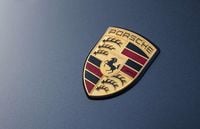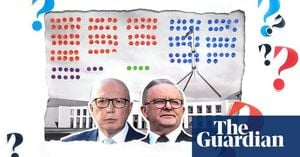Porsche AG is facing significant challenges as it navigates a tumultuous start to 2025, marked by disappointing financial results and heightened competition. The luxury sports car manufacturer, a subsidiary of Volkswagen, has recently reported a sharp decline in both revenue and profit margins, prompting concerns among investors and analysts alike.
In the first quarter of 2025, Porsche's revenue reached 8.86 billion euros, which was 1.7 percent lower than the previous year's figures. Even more alarming, the company's operating profit plummeted by 40.6 percent to 762 million euros, falling short of analysts' expectations. The operating margin dropped from 14.2 percent to 8.6 percent, a significant decline that reflects the tough market conditions Porsche is currently facing.
On April 28, 2025, Porsche's CEO Oliver Blume announced a downward revision of the company's annual forecasts, citing several factors that have contributed to the grim outlook. Among these are rising costs associated with battery production, the impact of new U.S. import tariffs, and a sluggish performance in the Chinese market. "The first quarter falls short of expectations," said CFO Jochen Breckner. "Moreover, the macroeconomic situation will remain challenging. We cannot completely avoid this, but we are doing everything we can to counter it."
Porsche now anticipates special costs of 1.3 billion euros for the year, which is half a billion euros more than previously estimated. In the first three months of the year, around 200 million euros were already allocated to specific measures aimed at addressing these challenges. Blume has adjusted the revenue forecast for 2025 to between 37 and 38 billion euros, which is two billion euros lower than the earlier projections.
Furthermore, the target range for the operating return on sales has been reduced from 10-12 percent to a more modest 6.5-8.5 percent. The increased U.S. tariffs, initially considered only for April and May, are expected to significantly impact the company's profitability. Blume noted that the financial burdens from tariffs have been estimated to be in the low three-digit million-euro range.
As Porsche grapples with these financial setbacks, it is also contending with fierce competition from Chinese automakers that are eager to capture market share in the luxury segment. Companies like BYD are making strides to establish themselves in Europe, putting additional pressure on Porsche and other luxury brands.
On April 29, 2025, the stock price of Porsche fell by 5.2 percent to 44.51 euros, reflecting investor unease. Over the past year, the stock has lost nearly half of its value, a stark contrast to the previous year's performance when shares were nearing the 90 euro mark. This downturn has left investors needing to exercise patience and resilience.
Analysts have pointed out that while the average selling prices for Porsche vehicles increased by nearly 5 percent in the first quarter, this was not enough to offset the overall decline in sales. Deliveries in China, the company's most significant market, fell by a staggering 42 percent, leading to a reevaluation of Porsche's strategy in the region. The company is choosing not to engage in price wars, a decision that may hurt short-term sales but is aimed at preserving the brand's long-term value.
In light of these challenges, Porsche has also decided to halt its plans for independent production of high-performance batteries through its subsidiary, Cellforce Group GmbH. This decision is expected to contribute to the rise in special expenses for the year. The company is exploring potential partnerships to bolster its battery production capabilities.
Additionally, Porsche is reducing its number of sales outlets in China from 150 to 100, a move that underscores the need to adapt to the current market environment. The demand for luxury electric vehicles is faltering in China, and the company is adjusting its offerings accordingly.
Despite the setbacks, there are glimmers of hope for Porsche. The share of fully electric vehicles in its deliveries has risen to 25.9 percent, indicating a positive trend in the company's shift towards electrification. The new electric Macan has been well-received by customers, and Porsche continues to invest in battery technology and research, which could pay off in the long run.
However, the road ahead remains fraught with uncertainty. The geopolitical landscape, particularly regarding U.S. tariffs, adds another layer of complexity to Porsche's operations. As the company navigates these turbulent waters, it will need to demonstrate agility and resilience to regain its footing in the luxury automotive market.
In summary, Porsche AG is at a critical juncture as it confronts a combination of rising costs, competitive pressures, and shifting consumer demand. With a revised financial outlook and a commitment to strategic adjustments, the company aims to overcome these challenges and secure its position as a leading luxury automaker.





